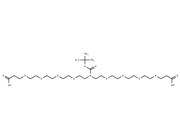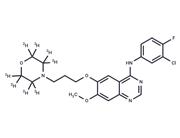| Name | Nonivamide |
| Description | Nonivamide (Nonanoic acid vanillylamide) is found in herbs and spices. Nonivamide is an alkaloid from Capsicum species Nonivamide is a flavoring ingredient. Nonivamide is an organic compound and a capsaicinoid. It is an amide of pelargonic acid and vanillylamine. It is present in chili peppers, but is commonly manufactured synthetically. It is more heat-stable than capsaicin. |
| Cell Research | Nonivamide is dissolved in ethanol to 1,000× stock solutions freshly each time and final ethanol concentration during the assays never exceeded 0.2% (v/v)[3]. In the MTT assay, the reduction of yellow tetrazolium salt MTT to a purple formazan by mitochondrial and ER enzymes is used as a measure for cell viability. Cells are seeded in 96‐well plates and treated with 1?nM-10?μM CAP or Nonivamide with or without addition of 25-100?μM BCH or the corresponding ethanol concentration (0.1-0.2% (v/v), solvent control) for 12 days after initiation of differentiation. Cell culture media is exchanged every second day. On Day 12, 100?μL of the MTT working reagent (0.83?mg/mL MTT diluted in PBS/serum-free media (1:5)), is added to each well, and cells are incubated at 37°C for approximately 15?min. The MTT working solution is removed and the purple formazan formed during incubation is dissolved in 150?μL DMSO per well. Absorbance is measured at 550?nm with 690?nm as reference wavelength using multiwell plate reader. The number of metabolically active cells is calculated relative to untreated control cells or the corresponding solvent control (100%)[3]. |
| In vitro | Nonivamide, a synthetic derivative of natural capsaicin, demonstrates effective antifouling activity. Capsaicin exhibits 4d-EC50 values of 5.5±0.5 mg/L, 23±2 mg/L, 6.9±0.2 mg/L, and 15.6±0.4 mg/L in static toxicity tests with Pseudomonas putida, Lake Erie bacteria, Vibrio natriegens, and Vibrio parahaemolyticus, respectively. When treated with 1 mg/L of Nonivamide for 4 days, a significant growth inhibitory effect (p<0.01) is observed, with an EC50 value (4d-EC50) of 5.1 mg/L [1]. Nonivamide triggers calcium release from the ER and alters the transcription of growth arrest- and DNA damage-inducible transcripts (GADD153, GADD45α, GRP78/BiP, ATF3, CCND1, and CCNG2) similarly to ER stress-inducing agents. ER calcium flux is assessed by pretreating cells with 2.5 μM thapsigargin for 5 min, followed by 2.5 μM Nonivamide. TRPV1-overexpressing cells treated with 2.5 μM Nonivamide show marked increases in cytosolic calcium due to ER calcium release, and treatment with 1 μM Nonivamide results in approximately 50% loss in cell viability after 24 hours. BEAS-2B cells treated with 100 and 200 μM Nonivamide exhibit a shift in EIF2α-P levels and increased GADD153 mRNA and protein expression [2]. Nonivamide also reduces lipid accumulation comparably to CAP, with significant reductions of 5.34±1.03% (P<0.05) at 0.01 μM and 10.4±2.47% (P<0.001) at 1 μM [3]. |
| Storage | Powder: -20°C for 3 years | In solvent: -80°C for 1 year | Shipping with blue ice/Shipping at ambient temperature. |
| Solubility Information | 10% DMSO+40% PEG300+5% Tween 80+45% Saline : 2 mg/mL (6.82 mM), Sonication is recommended.
DMSO : 255 mg/mL (869.12 mM), Sonication is recommended.
|
| Keywords | TRPVChannel | TRPV1 | TRPV Channel | TRPChannel | TRP Channel | Transient receptor potential channels | Nonivamide | Inhibitor | inhibit |
| Inhibitors Related | (+)-Camphor | AP 18 | Rosiglitazone | Caffeic Acid | Oleoyl Serotonin | (-)-Menthol | Camphor | Probenecid | Pregnenolone | 1,4-Cineole | trans-Cinnamaldehyde | Methyl salicylate |
| Related Compound Libraries | Pain-Related Compound Library | Traditional Chinese Medicine Monomer Library | Bioactive Compound Library | Membrane Protein-targeted Compound Library | Selected Plant-Sourced Compound Library | Anti-Cancer Clinical Compound Library | Drug Repurposing Compound Library | Natural Product Library for HTS | Flavor Natural Product library | Bioactive Compounds Library Max | Ion Channel Targeted Library | Anti-Cancer Drug Library |

 United States
United States






